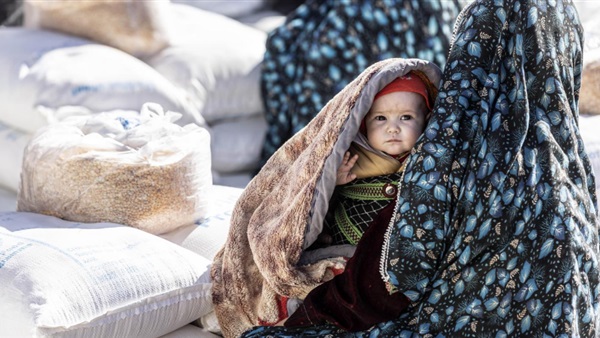Emergency food served up with skills for the future

When Hon Loyik’s family sowed their
wheat last year they said a prayer that this time the crop would not fail.
High in the mountains, they relied
on rain to water their fields. For a second year, the rain did not come.
They started selling their livestock
when the sheep began to fall ill, with too little water or grazing to nourish
them.
The last they sold were the
chickens, after they stopped laying, but got well below the old market price
“because no one else has the money to buy them”.
Already in debt after borrowing
$1,600 for their eldest son’s wedding in better times, the family faced hunger
and destitution. They found themselves among millions of Afghans thrown to the
brink of famine by two seasons of drought and the collapse of the country’s
economy after the western withdrawal and Taliban takeover.
“People have lost their children because of
the hunger,” Loyik said of the crisis enveloping Afghans from every strata of
society.
Last week she walked seven miles to
Dolaina to pick up life-saving emergency food supplies provided by the UN and
distributed by Afghanaid.
“If we didn’t receive this help, we could lose
our children too,” she said.
High in the central mountains of
Ghor province, the inhabitants of Dolaina live hardscrabble lives but never
needed such emergency help before. The district capital, its collection of
dun-coloured mud houses are scattered around a centre with a single diesel
pump.
People here have long lived hand to
mouth, farming just enough for their own families to eat with some produce to
barter for other supplies or help out those in temporary trouble.
“We always supported each other
through times of need,” Loyik’s friend Soraya said. “But now each of us hardly
has enough to feed our own families.”
The women signed on for an Afghanaid
programme to provide them with skills that could help to support them in the
future, from poultry training to dairy processing, in return for provisions to
carry them through the looming winter. Inside a mud-walled compound the women
crouch and wait for their names to be called to claim their provisions for the
next month: four sacks of wheat flour, one of split peas and a bag of salt. The
women move quietly, their faces cast down. There is some shame but little
choice in what they are doing.
Only the women will collect food
provisions in Dolaina today — Ghor’s Taliban governor has decreed that help
must not be distributed to men and women on the same day in the same village
for fear of them mixing with one another.
The men, known as mahram, or
escorts, without whom the Taliban will not allow a woman to travel, wait
outside with donkeys to haul back the 100kg load to their home villages.
The stories of lost crops and
livestock that died from lack of grazing and water are the same in neighbouring
Diwar Spid where the men are receiving their provisions.
“I am fortunate because I have plenty of
land,” Abdul Haq, 44, said. “But without rain or water I cannot cultivate it to
feed my family. We are thankful for this help to keep us through the winter. I
do not know what we would do without it.”
Droughts are coming harder and more
frequently here, a symptom of climate change that villagers know of only
through long memory of the weather patterns of the past.
No one can remember a drought as
hard as this one, following on the heels of such a severe one last year. A
traditional coping mechanism here in times of trouble is to send menfolk to
find work as labourers in neighbouring Iran. But Iran has problems of its own
this year and a cratering economy, forcing many Afghan migrant workers to
return empty handed.
It is a situation repeated over and
over in villages across Afghanistan where a staggering 95 per cent of families
do not have enough to eat. Right now, 23 million people are on the brink of
starvation.
The women of Dolaina know they are
fortunate that aid organisations can reach them. “Without their help I cannot
imagine what we would do,” Soraya said.
All have heard the tales of
daughters sold off in marriage years before they reach puberty and of desperate
people digging through the snow in search of grass or tubers to eat. Things are
not yet that desperate here, thanks to the assistance they receive from
Afghanaid — a charity being supported by this year’s Times and Sunday Times
Christmas Appeal — and the World Food Programme.
They worry, however, about their
future in a newly isolated Afghanistan, the poorest country in Asia by some
margin and now designated by the United Nations as the worst humanitarian
crisis in the world.
“Before, under the old government,
we had the support of the world and we were very grateful for it,” Loyik said.
“We are truly frightened what will happen in the coming years. I don’t think
the Taliban care about friendship with the outside world but it is us that will
suffer for it not them. Whatever you believe is right or wrong, people cannot
survive if they cannot eat.”





